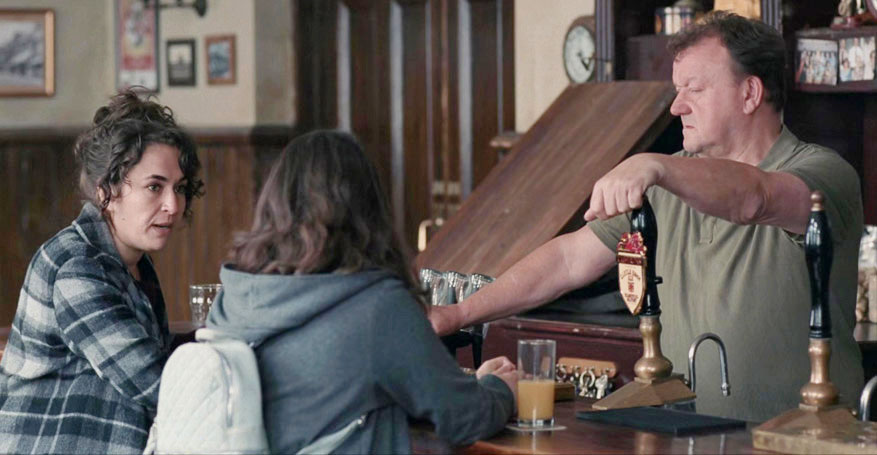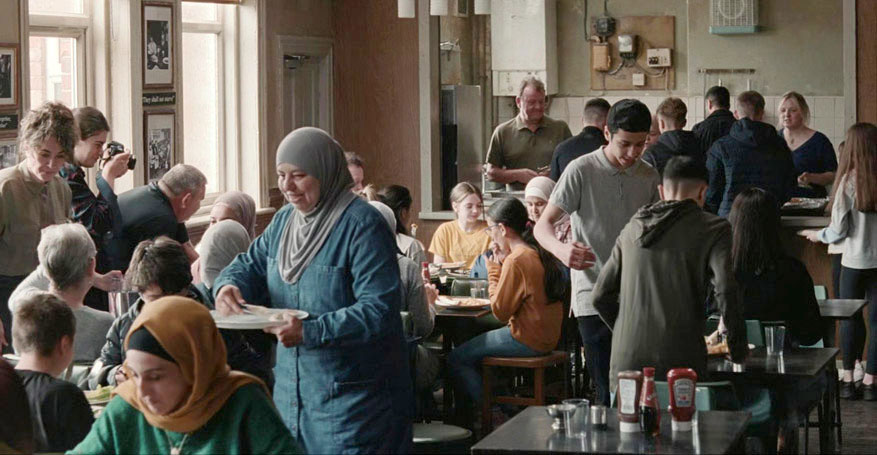| |
"So we went to Paul to write something that has hope but isn't fantasy. I mean he couldn't write something fantastical in the situation we're in today where every aspect of our civil society is collapsing – health, education, housing… This collapse has been presided over by the Tories who instigated it, the Labour party that colluded with it, as well as the worst, most cynical, opportunist, unprincipled Labour leadership we've seen in our lifetimes. Where on earth can you find hope?" |
| |
Director Ken Loach* |
That's the defining question of our times. Hope is horribly elusive to the more marginalised people in this island nation. So how does Ken Loach do what he does? Moreover, how does he keep doing it? Regardless of your politics, you cannot easily dismiss a man so wedded to his guns for a lifetime and being able to sustain core political principles that might have been compromised along the course of another person's life and softened for the sake of making that life easier to live. Apathy and feeling unable to challenge the poisonous status quo have driven this country to a brink of sorts brought on by populism, constant lies, obfuscation, aggressive disdain and powerful people disregarding why they were put into power in the first place, feathering their own nests in such a shameless fashion, it's hardly conceivable. I keep on seeing the late William Hurt's astonished face in A History of Violence, after five men have failed to kill his brother, played by Viggo Mortensen. "How do you fuck that up? HOW do you FUCK THAT UP?" We should be asking the same question to our leaders as forcefully and I write this on the day the heinous Rwanda plan unravels in Parliament. So how does someone as staunchly left wing as Ken Loach plan to give us all hope in such a context of powerlessness, uncertainty and misery? Well, have a look at The Old Oak. Writer Paul Laverty, a long-time part of Loach's stock filmmaking company, was given the task of finding hope in what could have been a hopeless situation. Take a northern town with a once proud mining tradition, now ironically undermined by austerity, all but abandoned and its citizens regarded as fringe dwellers by the well-heeled, heartless power brokers and then… introduce war refugees from Syria. As mentioned by writer Paul Laverty, why are they not housed in Westminster or Chelsea? A rhetorical question to trump all others.

The first scene of this powerful drama actually had me believe that what I was hearing and seeing were snatched audio and photos from a real incident. It was horribly raw, utterly believable and given the state of the nation in 2016, in no way surprising. Black and white snaps show a group of people on the pavement in a road that could well have looked the same seventy years ago, terraced houses, narrow streets and men (with one in particular) cynically and profanely curious and then increasingly angry about the arrival of a coach bearing Syrian refugees. The character in the Newcastle shirt**, the most viciously vocal, demands the pictures taken of him be erased. A Google search identifies the aggressive character as Rocco superbly played by Neil Leiper. He stands towering over the Syrian photographer, Yara, played sensitively by Elba Mari. After he snatches her precious camera from her bag and she tries to take it back off him, the lens is smashed. It is the first ugly skirmish of many to come. It hardens Yara's heart and she's determined to find Rocco and demand money to have her camera lens fixed. The portly owner of the run-down pub, The Old Oak, barely scraping a living from his disgruntled regulars, is TJ Ballantyne who steps in to quieten down the situation but the damage is done. TJ, played by Dave Turner, is our leading man if there can be such a thing in a Ken Loach ensemble but he is as far from a movie actor as it's possible to be which is why he is utterly perfect in the role, snagging a Best Actor gong at the Valladolid International Film Festival (that's in Spain by the way).
The battlelines are drawn along the harsh contours of very basic human needs and economic survival. The frightened, traumatised-by-war Syrians face angry locals who utterly resent their presence adding distress to both groups' own significant hardships. Is there is a wide but fluidly blurry line between desiring to live in amongst one's own 'tribe' and blatant xenophobia? That's a tricky nuance to find particularly these days. Hair-trigger accusations of racism seem to be ubiquitous, fuelled by the shortcomings and business models of social media. From my own perspective, these are heavily intersecting sets. I can understand why outsiders would be looked upon, at the very least unfavourably by small, once hermetically sealed communities. I live in a small village tucked in amongst multi-acres of farmland and if I see someone I've not seen before, a primal instinct kicks in, one I'm happy to (and have practised to) ignore. Who is this and why are they here? But I'm light years away (I hope) from treating one person any differently as I would another unless someone is attacking me. Not sure I'd ever turn the other cheek, I mean Jesus, come on.
So while the "I'm not racist, but" brigade have a significant presence in the film, you are able to be mildly sympathetic to the villagers having been ground down by so many other factors. In some way, the poor, hapless Syrian contingent unknowingly offer a heartless and cruel release valve for the culmination of previous frustrations. This situation (flippancy not my goal here, I promise) reminds me of a Tim Vine joke. A man goes to the doctor and the doctor says "You have hypochondria," and the man replies "Not that as well…" For those who wanted to rail against the injustices of the world were given just that opportunity by the refugee influx. "Not that as well…" TJ gradually gets to know Yara, feeling sorry for her bad luck with the camera. He opens up the back room of his pub, an area closed off, one too expensive to re-wire and heat, to root around for old cameras as a replacement. Yara says that the camera was a gift from her father and so it has a sentimental value. TJ agrees to get the camera fixed in exchange for a few of his older cameras. Their relationship is the quiet, polite, inclusive centre of The Old Oak and as we get to know TJ a little more we begin to understand the opposite directions he's pulled in (be a decent man to the refugees versus keeping his bigoted regulars happy) and the decisions he has to make to survive. Eventually the feeding of starving children of the ex-miners, immortalised in framed black and white photos on the wall of the back room, encourage TJ to do the right thing going against the tidal wave of social pressure…

In the genre in which Loach has made his home, there is no room for directorial fireworks and grandstanding. Editor Jonathan Morris said that even a Steadicam which was used in I, Daniel Blake was something of a radical departure. Blake's (and Oak's) cinematographer Robbie Ryan says that with Ken, "…any evidence of the camera or film equipment makes the honesty of the situation diminished. So I guarantee if Ken could make a film without a camera he would." That would be a movie to marvel at. But there is a lot to be said for how this unfussy presentation reinforces the suspension of disbelief and doesn't diminish it. I was no less moved because of the simplicity of the direction. By the halfway mark, there's an event signposted earlier which hit people like myself hard – no spoilers. After that trauma, I was really gunning for a hopeful ending. As I said, no spoilers.
The cast is uniformly good and better than that, believable. Some reviewers have suggested that the acting wasn't polished enough but I can't help pushing back against that opinion from those who must know that Loach hires real people to play themselves on screen. Does knowing that help that critical bias? I see that as a straw dog of sorts. Ryan's photography does exactly what's needed while Morris' brisk but sensitive editing gently elicits the emotion with little fanfare or fuss. As a child of 8, I was terribly moved by Ken Loach's Kes in 1969, which he made at the venerable old age of thirty-three. Here I am, fifty-four years later still being moved by the honesty of his work and his championing of the oppressed and downtrodden. I've by no means seen all of his work but with The Old Oak being his final film, he's going out with his head and his principles still held high. Highly recommended.
|